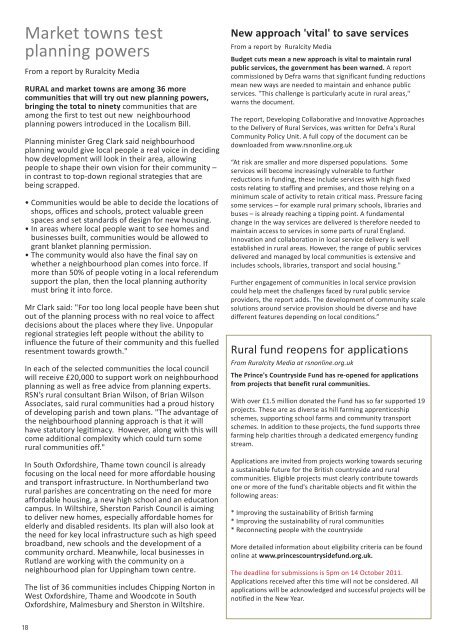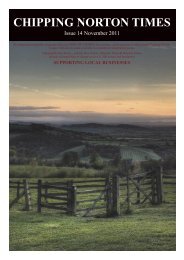Issue 13 - October 2011 (PDF - Chipping Norton Times
Issue 13 - October 2011 (PDF - Chipping Norton Times
Issue 13 - October 2011 (PDF - Chipping Norton Times
You also want an ePaper? Increase the reach of your titles
YUMPU automatically turns print PDFs into web optimized ePapers that Google loves.
Market towns test<br />
planning powers<br />
From a report by Ruralcity Media<br />
RURAL and market towns are among 36 more<br />
communities that will try out new planning powers,<br />
bringing the total to ninety communities that are<br />
among the first to test out new neighbourhood<br />
planning powers introduced in the Localism Bill.<br />
Planning minister Greg Clark said neighbourhood<br />
planning would give local people a real voice in deciding<br />
how development will look in their area, allowing<br />
people to shape their own vision for their community –<br />
in contrast to top-down regional strategies that are<br />
being scrapped.<br />
• Communities would be able to decide the locations of<br />
shops, offices and schools, protect valuable green<br />
spaces and set standards of design for new housing.<br />
• In areas where local people want to see homes and<br />
businesses built, communities would be allowed to<br />
grant blanket planning permission.<br />
• The community would also have the final say on<br />
whether a neighbourhood plan comes into force. If<br />
more than 50% of people voting in a local referendum<br />
support the plan, then the local planning authority<br />
must bring it into force.<br />
Mr Clark said: "For too long local people have been shut<br />
out of the planning process with no real voice to affect<br />
decisions about the places where they live. Unpopular<br />
regional strategies left people without the ability to<br />
influence the future of their community and this fuelled<br />
resentment towards growth."<br />
In each of the selected communities the local council<br />
will receive £20,000 to support work on neighbourhood<br />
planning as well as free advice from planning experts.<br />
RSN’s rural consultant Brian Wilson, of Brian Wilson<br />
Associates, said rural communities had a proud history<br />
of developing parish and town plans. "The advantage of<br />
the neighbourhood planning approach is that it will<br />
have statutory legitimacy. However, along with this will<br />
come additional complexity which could turn some<br />
rural communities off."<br />
In South Oxfordshire, Thame town council is already<br />
focusing on the local need for more affordable housing<br />
and transport infrastructure. In Northumberland two<br />
rural parishes are concentrating on the need for more<br />
affordable housing, a new high school and an education<br />
campus. In Wiltshire, Sherston Parish Council is aiming<br />
to deliver new homes, especially affordable homes for<br />
elderly and disabled residents. Its plan will also look at<br />
the need for key local infrastructure such as high speed<br />
broadband, new schools and the development of a<br />
community orchard. Meanwhile, local businesses in<br />
Rutland are working with the community on a<br />
neighbourhood plan for Uppingham town centre.<br />
The list of 36 communities includes <strong>Chipping</strong> <strong>Norton</strong> in<br />
West Oxfordshire, Thame and Woodcote in South<br />
Oxfordshire, Malmesbury and Sherston in Wiltshire.<br />
18<br />
New approach 'vital' to save services<br />
From a report by Ruralcity Media<br />
Budget cuts mean a new approach is vital to maintain rural<br />
public services, the government has been warned. A report<br />
commissioned by Defra warns that significant funding reductions<br />
mean new ways are needed to maintain and enhance public<br />
services. "This challenge is particularly acute in rural areas,"<br />
warns the document.<br />
The report, Developing Collaborative and Innovative Approaches<br />
to the Delivery of Rural Services, was written for Defra's Rural<br />
Community Policy Unit. A full copy of the document can be<br />
downloaded from www.rsnonline.org.uk<br />
“At risk are smaller and more dispersed populations. Some<br />
services will become increasingly vulnerable to further<br />
reductions in funding, these include services with high fixed<br />
costs relating to staffing and premises, and those relying on a<br />
minimum scale of activity to retain critical mass. Pressure facing<br />
some services – for example rural primary schools, libraries and<br />
buses – is already reaching a tipping point. A fundamental<br />
change in the way services are delivered is therefore needed to<br />
maintain access to services in some parts of rural England.<br />
Innovation and collaboration in local service delivery is well<br />
established in rural areas. However, the range of public services<br />
delivered and managed by local communities is extensive and<br />
includes schools, libraries, transport and social housing."<br />
Further engagement of communities in local service provision<br />
could help meet the challenges faced by rural public service<br />
providers, the report adds. The development of community scale<br />
solutions around service provision should be diverse and have<br />
different features depending on local conditions.”<br />
Rural fund reopens for applications<br />
From Ruralcity Media at rsnonline.org.uk<br />
The Prince's Countryside Fund has re-opened for applications<br />
from projects that benefit rural communities.<br />
With over £1.5 million donated the Fund has so far supported 19<br />
projects. These are as diverse as hill farming apprenticeship<br />
schemes, supporting school farms and community transport<br />
schemes. In addition to these projects, the fund supports three<br />
farming help charities through a dedicated emergency funding<br />
stream.<br />
Applications are invited from projects working towards securing<br />
a sustainable future for the British countryside and rural<br />
communities. Eligible projects must clearly contribute towards<br />
one or more of the fund's charitable objects and fit within the<br />
following areas:<br />
* Improving the sustainability of British farming<br />
* Improving the sustainability of rural communities<br />
* Reconnecting people with the countryside<br />
More detailed information about eligibility criteria can be found<br />
online at www.princescountrysidefund.org.uk.<br />
The deadline for submissions is 5pm on 14 <strong>October</strong> <strong>2011</strong>.<br />
Applications received after this time will not be considered. All<br />
applications will be acknowledged and successful projects will be<br />
notified in the New Year.













